Emotional Capitalism
Explore how our emotions, distorted by capitalism, can be converted into ethical and subversive emotions.

Explore how our emotions, distorted by capitalism, can be converted into ethical and subversive emotions.
Explore how our emotions, distorted by capitalism, can be converted into ethical and subversive emotions.
Political, Popular culture, Social
As today’s emotional capitalism increasingly carries out its core operation of regulating the psycho-energy of individuals, the need to analyse a variety of methods for emotional production becomes important. By bringing together the works of Byung-Chul Han, Bernard Stiegler, Emmanuel Levinas, and Judith Butler, this bold analysis offers a fresh perspective on the operation of emotional capitalism today, with various possibilities for evolving a sensitivity to social injustice and the suffering of others through an ethical, affective, and bodily inter-subjective connection.
Click on the circles below to see more reviews
In what is a genuine pleasure to read, from cover to cover this impassioned, dutifully sculpted prose is as thought provoking, as engaging as you could have ever hoped it would be. ~ Exclusive Magazine , FULL REVIEW - https://annecarlini.com/ex_books.php?id=632
Emotional Capitalism critically interrogates the negative impacts of capitalism’s growing manipulation of our emotional life and subjectivity through different regimes and discourses. Besides offering a comprehensive analysis of the mechanism of today's emotional capitalism, Peter Lok also asks how 'our repressed emotions' which have been 'distorted' and 'regulated' by 'emotional capitalism' can be transformed into 'ethical emotions'. What kinds of emotional experiences can transform a self-centered subject into an other-centered subject? This book has offered an innovative contribution to the topic of emotional capitalism with theoretical courage and critical insight. ~ Christian Marazzi, author of Capital and Affects: The Politics of the Language Economy
Peter Lok finally gives us the topography of emotion we have been waiting for, from the qualitative to the quantitative and from the passive to the internal and, subsequently, to external action. This heuristic model thus extends itself not only to fields of evolutionary biology, sociology, cultural studies, psychology, and politics but also to the more pertinent paradigm of what we could call a ‘Capitalist Realism’ (Fisher) of the twenty-first century. ~ Charles William Johns, author of Object Oriented Dialectics: Hegel, Heidegger, Harman
An important contribution to our understanding of the dark and deeply woven threads of emotion which underpin both early and contemporary forms of capitalism and the necessity of protest against it. It was a pleasure to read. ~ Ron Roberts, author of Psychology and Capitalism, and The Off-Modern: Psychology Estranged